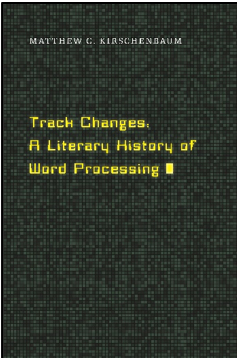Publication Details
| OLOR Series: | ROLE Reviews |
| Author(s): | Diane Martinez |
| Original Publication Date: | 15 July 2018 |
| Permalink: |
<gsole.org/olor/rolereviews/2018vol1no2.rev7> |
Publication Note
This review was originally published in Research in Online Literacy, vol. 1, no. 2 (2018).
Resource Overview
Media, Figures, Tables |
Resource Contents
Review of Track Changes: A Literary History of Word Processing
I have never thought about writing a book review so much as this one on Track Changes: A Literary History of Word Processing. Although I always consider my writing process so that I meet my deadlines, I never think about the record of my writing process, the word processing program I use, the keyboard shortcuts I use to delete text or move it around, or the fact that I can change fonts and design text on my own computer. I think about gender and technology sometimes, but I never placed gender next to word processing specifically. As a more mature (aka older) writer, I do have a personal history with word processing where I started out with WordStar and WordPerfect on computers that had 20 MB hard drives, and I used floppy and 3 ¼-inch disks, but I have not thought about how those storage devices affected my writing process or how the evolution of word processing, in particular, affected me as a writer or reader—at least not consciously. When I first picked up Track Changes, I expected a chronological history of word processing; I expected to read about programs, computers, and the ways computer technology has changed over the years; I expected that Kirschenbaum might even have some insight into the future of word processing that mainstream media has not yet picked up on. I was, however, pleasantly surprised in the way Kirschenbaum narrated and described “in material and historical terms how computers, specifically word processing, became integral to literary authorship and literary writing” (p. xiii).
I began the book wondering what a “literary history” meant, and why it mattered which novelists used a word processor or which ones did not. I was afraid that the book might turn into a biography of different authors and their affection or aversion to technology, and unless I was curious about a particular author, who really cared? Interestingly, the book took me on a different journey that answered my questions and unveiled a compelling history about how word processing affects the writing process, how women (secretaries) were responsible for learning and running computer equipment—a skill that was “rarely acknowledged” or “defined as inferior simply because it was women’s labor,” and that women were responsible for gaining expertise in the “very machine that was supposed to be replacing her” (p. 176). I learned about the evolution of word processing and work flow, information management and storage, social perceptions about writing with computers, and upcoming potential of computers and writing. Track Changes is not a book that repeats what everyone already knows—computers have changed writing—instead, it is an exploration in the evolution of word processing through stories about Stephen King, Amy Tan, John Updike, and many others. Some writers embraced computer technology with gusto while others maintained a hybrid process or steered clear of computers like Wendell Berry. The subject of the stories, however, is not the authors; it is word processing. For instance, in “Signposts,” readers will learn about several science fiction authors, such as Jerry Eugene Pournelle, Frank Herbert, and a whole slew of others, who took up word processing to varying degrees, but the chapter is not a biography of these authors’ use of computers; it is about the first users of word processing and the cultural implications these first users had on society’s view of writing, computers, and the computer marketplace.
Track Changes would make an excellent introduction to a graduate course on writing in electronic environments. Kirschenbaum brings to the forefront issues that writers and readers often take for granted, such as writing on a screen, deleting words, sentences, or whole blocks of text, or how fast writers can bring ideas to fruition via typing versus physical writing. Readers will walk away from this book with a new appreciation for their writing process, for every stroke on a keyboard or pad of paper, and for every file created by “Save.” Track Changes helps readers including academics, students, and practitioners to recognize the importance of historical cultural shifts that have taken place due to word processing alone and to be aware of ways technology alters the current world.
About the Reviewer
Diane Martinez is an assistant professor of English at Western Carolina University where she teaches professional and technical communication courses. She also serves as the Professional Writing Program Director. Her research interests include technical communication and globalization, advocacy in technical communication, the Bologna Process, digital literacy, and online education.



